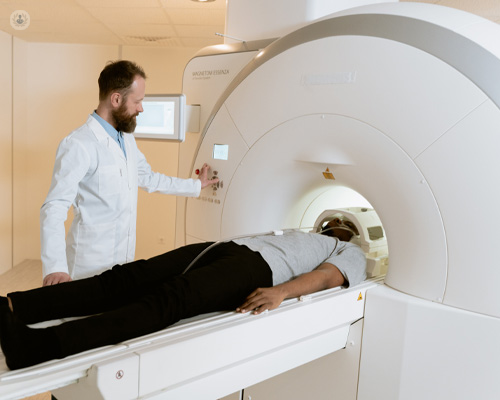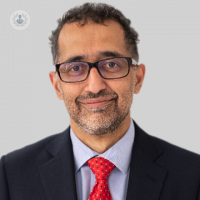CT coronary angiogram: what do you know?
Written by:Sometimes a CT coronary angiogram (CTCA) may be necessary to check out the heart. When is it appropriate, who can have it, and what should you expect? Dr Iqbal Malik, a leading cardiologist, has detailed this essential information and answered the basic questions about CT coronary scans.

Why would a cardiologist order a CTCA?
A CTCA is usually ordered to assess the coronary blood vessels to see if there are any blockages, to see if there is minor furring up, or to prove they are totally normal! If you have had a previous coronary bypass (CABG), a CTCA can define how many of the bypasses are still open.
What are the different types of CT scan used in diagnosis of heart problems?
- The commonest CT scan is a CT coronary angiogram.
- A CT whole aorta can be used to look at all the blood vessels from the groin to the heart—often assessing for valve interventions (such as TAVI).
- A chest CT can be used to assess the lungs to see if a breathing problem is due to the lungs being scarred.
- A CTPA is used to exclude blood clots in the lungs—a pulmonary embolism stuck in the pulmonary arteries.
What can a heart CT scan detect?
A CTCA can detect coronary artery disease even before the blockages have caused symptoms. It can pick up other incidental abnormalities in the lungs even when we did not look for them. The other types of CT scans and what they do are listed above.
Can a CT scan detect blocked arteries?
Yes. When the heart rate is slow enough (i.e. about 60 beats a minute) and the pictures are still (i.e. there is a well-timed breath-hold), it can show:
- total normality and no calcium in the walls
- the arteries wide open but calcium in the walls—an early marker of risk
- minor plaque disease <50 per cent
- moderate disease 50 to 70 per cent narrowed
- severe disease >70 per cent narrowed
Can it be reversed?
Coronary disease cannot be reversed or “leached out” or “decalcified”. Instead, we can stop the progression by actively lowering all your risk factors. In addition, such actions (e.g. stopping smoking and taking statins) also reduce the inflammation in your arteries, making the plaques less likely to rupture and set off for a heart attack.
How to prepare for a heart CT scan
It involves x-rays and so it is rarely done in pregnancy. The x-ray dose is about the same as natural radiation on a flight to Australia and back. The dye we use can sometimes affect the kidneys. Thus, we do need to see you and assess you before ordering a cardiac CT—you can’t “just have one”.
A CT scan requires you to lie comfortably on the CT table. You will need a cannula (a drip) in your arm or hand if we need to give medication or dye. You may need to request sedation in advance if you are very claustrophobic; although, the CT scanner is usually easier to tolerate than an MRI scan. Be prepared to be in the scanner room for 15 to 20 minutes. Don’t eat a big meal just before the scan, but you don’t need to be starved for a cardiac CT scan.
You will be fine to go back to normal activities in most cases. If you have been given a beta blocker to slow the heart rate you may feel tired that day. Your cardiologist will discuss the results with you. What we do next depends on what we find.
To schedule a cardiac consultation with Dr Iqbal Malik, you can go to his Top Doctors profile and request a visit.


